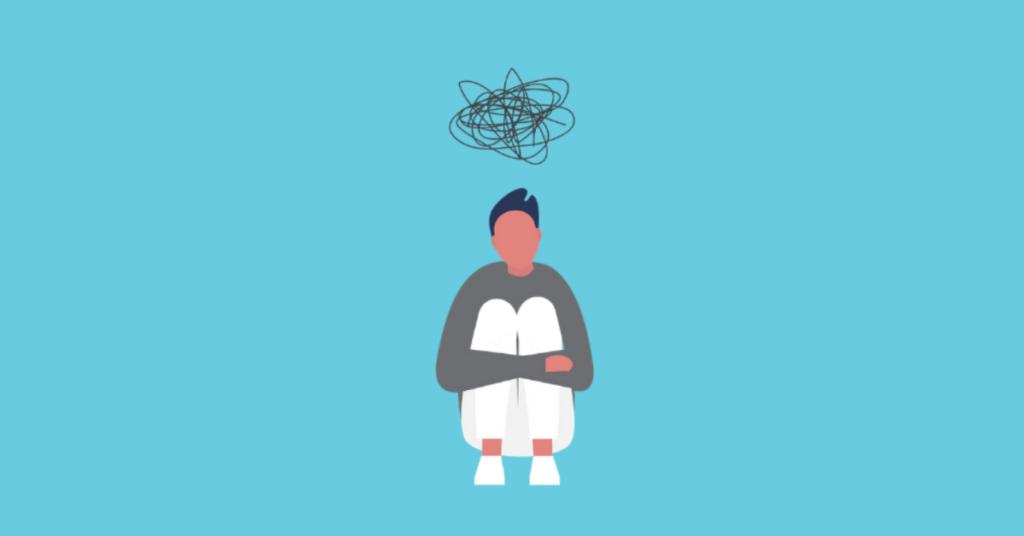Did you know that depression is the leading cause of disability in the world for men aged 15-44? Yet, it is often seen as a “woman’s disease.” This is because men are less likely to seek help for their mental health issues, and are more likely to suffer in silence. In this blog post, we will discuss the symptoms of depression in men, and how you can get help if you or someone you know is suffering from this illness.
Contents
Defining Depression In Men
 When we think of depression, the first thought that comes to mind is often of a woman curled up in bed, too sad to get up or take care of herself. This image is not wrong, but it does not give the whole picture. Depression does not discriminate, and it can affect anyone at any time.
When we think of depression, the first thought that comes to mind is often of a woman curled up in bed, too sad to get up or take care of herself. This image is not wrong, but it does not give the whole picture. Depression does not discriminate, and it can affect anyone at any time.
Depression is a real mental illness. Lately it has been reduced down to a synonym for feeling sad or down. However, the reality is much more grave. Depression can be all-consuming, and if left untreated, can be deadly.
There are many different types of depression, but the most common form is Major Depressive Disorder (MDD). MDD is characterized by a persistent low mood that lasts for at least two weeks. This low mood must be accompanied by at least five of the following symptoms:
- Feeling hopeless, helpless, or worthless
- Loss of interest in activities that were once enjoyed
- Decreased energy or fatigue
- Sleeping too much or insomnia
- Changes in appetite leading to weight loss or gain
- Anxiety, agitation, or restlessness
- Slowed thinking, speaking, or body movements
- Feelings of worthlessness or guilt
- Fixation on death or suicide
These symptoms must be present every day, and they must interfere with the individual’s ability to function in their everyday life. While women are more likely to be diagnosed with depression, men are more likely to suffer from undiagnosed or untreated depression. This can happen due to a variety of reasons.
If you or any man you know is dealing with depression, it is important to seek help. Depression is a treatable illness but left untreated, it can worsen. There is hope to get better.
Prevalence
While the exterior may not seem as though anything is wrong, on the inside, men suffering from depression are in a dark place. It can be hard for them to function day-to-day, but they often try to put on a brave face for those around them. This can make it difficult to spot the signs of depression in men.
The reality is, depression is quite common in men. In fact, it is the leading cause of disability in men aged 15-44 worldwide. About one in eight men will experience depression at some point in their lives. This number is likely even higher, as many cases of depression go undiagnosed or untreated.
This number is on a rise with an increase of about 12% in the number of men who reported experiencing depression between 2005 and 2015. The most common age group for men with depression is 45-49.
Causes
Depression is a very complex and individualized illness. There is not one single cause of depression. Rather, it is thought to be caused by a combination of environmental, cultural and psychological factors.
Psychological
 Psychological causes of depression in men can be of various origins. Men are more likely to bottle up their emotions, which can lead to a build-up of negative feelings over time. This can be due to a number of factors which can be seen below.
Psychological causes of depression in men can be of various origins. Men are more likely to bottle up their emotions, which can lead to a build-up of negative feelings over time. This can be due to a number of factors which can be seen below.
- First, men are more likely to suffer from perfectionism. They often put unrealistic pressure on themselves to succeed. When they don’t meet these high standards, they can feel like failures.
- Moreover, men are more likely to have a “stiff upper lip” mentality. This means that they believe that they should not show any weakness or emotion. This can lead them to bottle up their feelings, which can eventually lead to depression.
- As we also might remember, hormones can play a role in depression. testosterone levels can drop as men age, which can lead to a decrease in libido and energy levels. This can also contribute to feelings of depression.
- Other psychological barriers such as low self-esteem, negative thinking, and rumination can also lead to depression in men.
Socio-Cultural
An individual lives in conjunction with his society and culture. It is impossible to separate the two. Socio-cultural factors can play a role in the development of depression. The way in which these aspects can lead to depression in men include:
- The stereotype that men should be “strong and silent” is one of the most damaging socio-cultural factors that can lead to depression in men. This stereotype puts an unreasonable amount of pressure on men to bottle up their emotions and not show any weakness. As we know, this can lead to a build-up of negative emotions which can eventually lead to depression.
- Moreover, men are more likely to suffer from financial stress. This can be due to a number of factors such as the gender pay gap, which leaves women earn less than men for doing the same job. This can lead to financial insecurity and stress, which can contribute to depression.
- In addition, social isolation is a risk factor for depression. Men are more likely to suffer from social isolation due to a number of factors such as work demands, caring for family members, and social stereotypes. This isolation can lead to feelings of loneliness and despair, which can eventually lead to depression.
All of these cultural messages can add up to create a perfect storm for depression in men.
Environmental
There are also many environmental factors which can lead to depression. These range from one’s social environment to one’s physical environment.
- One example of an environmental factor that can lead to depression is toxic stress. Toxic stress is a type of stress that is caused by exposure to traumatic events or chronic adversity. This can lead to changes in the brain which can eventually lead to depression.
- Another example of an environmental factor that can lead to depression is a lack of sunlight. This is because sunlight helps our bodies produce vitamin D, which is essential for our mental health. A lack of sunlight can lead to a deficiency in vitamin D, which can contribute to depression.
- Poor living conditions such as poverty, overcrowding, and noise pollution can also lead to depression. This is because these conditions can add to the stress of everyday life and make it more difficult to cope.
There are many different environmental factors that can lead to depression.
Biological
 At last, it is no secret that biology can play a role in the development of depression. There are many different biological factors that can contribute to the condition.
At last, it is no secret that biology can play a role in the development of depression. There are many different biological factors that can contribute to the condition.
- One of the most well-known biological factors that can lead to depression is a chemical imbalance in the brain. This means that there is an imbalance of neurotransmitters, which are chemicals that help transmit messages between neurons. This can lead to a number of different symptoms such as low mood, fatigue, and insomnia.
- Another biological factor that can lead to depression is a family history of the condition. This means that if you have a close relative who suffers from depression, you are more likely to develop the condition yourself. This is due to a combination of genetic and environmental factors.
- Moreover, certain medical conditions can also lead to depression. This is because some medical conditions can cause a chemical imbalance in the brain or lead to physical and emotional changes that can be difficult to cope with
These are all of the different ways in which depression can develop in men. It is important to remember that depression is a very real and serious condition that should not be ignored. It can be due to a crossover of any and all these reasons.
***
Reasons Depression In Men Goes Unnoticed
Mental illnesses by themselves have a huge taboo attached to their name. However, situation tends to get worse when the mentally ill person is a man. There are several reasons why depression in men goes unnoticed.
- One of the main reasons depression in men goes unnoticed is because of the stereotypes surrounding masculinity. Men are expected to be strong, invulnerable, and emotionless. They are not supposed to show any weakness or vulnerability. This can lead to men bottle up their emotions and not seeking help when they need it.
- In addition, men are also expected to be the breadwinners of the family. This can add a lot of pressure and stress on men, which can eventually lead to depression. However, because of the expectation that men should be able to handle this pressure, they often do not seek help when they start to feel overwhelmed.
- Another reason why depression in men goes unnoticed is because of the lack of awareness. Depression is often seen as a “woman’s disease”. This is because women are more likely to talk about their feelings and emotions. They are also more likely to seek help when they are feeling down. On the other hand, men are often seen as stoic and strong. This can lead to men suffering in silence because they feel like they have to tough it out.
- Lastly, men themselves refrain from seeking help because of the stigma attached to mental illness. Men are often seen as weak or crazy if they admit that they are struggling mentally. This can prevent men from seeking the help they need to get better.
If you are a man struggling with depression, it is important to know that you are not alone. There are many other men out there who are going through the same thing.
Consequences
While it may not seem like it, but the consequences of depression in men can be dire and even deadly. Suicide is one of the leading causes of death in men, and depression is a major risk factor for suicide. In addition, depression can also lead to problems with substance abuse, as men turn to drugs or alcohol to cope with their emotions.
Depression can also have a negative impact on physical health. Depression has been linked to an increased risk of heart disease and other chronic health conditions. This is because depression can lead to unhealthy lifestyle choices, such as not exercising or eating healthy.
If you are a man struggling with depression, it is important to seek help. There are many resources available to help you get through this tough time. Remember, you are not alone in this battle.
Ways To Deal
Fortunately, there are ways to ease the stigma and struggles that men face. These tips will help you get an overall idea of what to do if you see someone struggling. So whether you are a woman looking for ways to support the men in your life or a man trying to figure out how to deal with your own depression, these tips will be of great help.
Acknowledge the issue
The very first step towards dealing with depression is acknowledging that it exists. This is especially important for men, as they are more likely to bottle up their emotions and not seek help. Acknowledge that depression is a real problem and that it can be just as debilitating for men as it is for women.
Create a safe space
 As we read, most of the time men shy away from talking about their issues is due to societal and cultural expectations. Create a safe space for the men in your life to openly talk about their feelings without judgment. This can be done by simply listening to them and letting them know that it’s okay to feel whatever they are feeling. You may even want to consider going to therapy with them to help them open up.
As we read, most of the time men shy away from talking about their issues is due to societal and cultural expectations. Create a safe space for the men in your life to openly talk about their feelings without judgment. This can be done by simply listening to them and letting them know that it’s okay to feel whatever they are feeling. You may even want to consider going to therapy with them to help them open up.
Reserve judgments and assumptions
The fear of facing judgments can also make a person not open up. For example, men may fear hearing statements such as “you are too tough to feel this way” or ” real men don’t cry”. When talking to someone with depression, reserve any judgments or assumptions you may have. This will help create an open and understanding environment.
Educate yourself
Many times, the lack of knowledge is what fuels the stigma around mental illness. Take the time to educate yourself on depression and other mental health disorders. This will help you be more understanding and supportive when talking to someone with depression. There is a variety of information available online and in books.
Provide sympathy instead of empathy
It is very easy to pity or look down on someone when they are struggling. However, what depressed individuals need is sympathy. This means that you understand what they are going through and feel bad that they have to go through it. Do not try to compare your struggles to theirs or tell them that things could be worse. Just provide a shoulder to cry on and be there for them.
Join support groups
Goes without saying that support groups are a great way to feel understood and gain different perspectives. If you are struggling with depression, consider joining a support group for men. This is a great way to connect with other men who are going through similar struggles. There are a variety of support groups available online and in person.
Seek professional help
 In addition, there are many different treatments available for depression. These include medication, therapy, and even alternative treatments like yoga or meditation. You should work with your doctor to find the best treatment for you.
In addition, there are many different treatments available for depression. These include medication, therapy, and even alternative treatments like yoga or meditation. You should work with your doctor to find the best treatment for you.
If you have a man in your life who is shy or unwilling to talk about their depression, try reaching out to them. Oftentimes, all it takes is a little encouragement and understanding to get someone to open up. Just remember to be patient and non-judgmental. Creating a safe and supportive environment is key to helping someone with depression.
Conclusion
To conclude our blog post, we can determine that depression in men is a real and serious issue. It is important to educate yourself on the topic, reserve judgments, and provide sympathy. If you are struggling with depression, consider joining a support group or seeking professional help. Remember, if you are struggling, you are not alone. There are plenty of resources and people who can help you through this difficult time.
If you or someone you know is looking for psychological help, Therapy Mantra is here for you. We are the leading providers of online therapy and counseling. Our team of highly trained and experienced therapists can provide assistance at the most affordable rates. Contact us today to learn more about our services. You may also visit our website to book an online therapy session or download our free Android or iOS app for more information.


